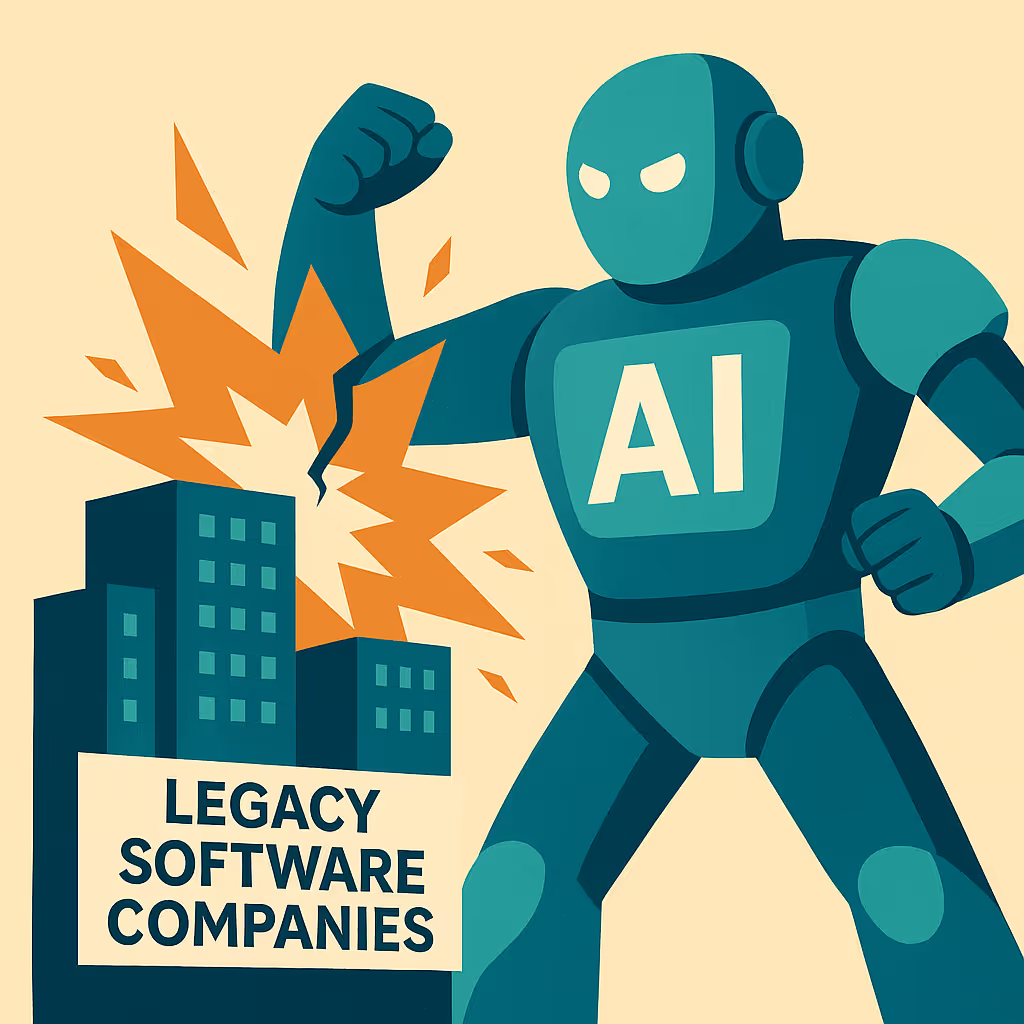How AI Agent Startups Are Disrupting Legacy Software Companies
Discover how AI agent startups are disrupting legacy software companies with intelligent, autonomous solutions. Explore their impact on enterprise automation, CRM, SaaS, and more.

4 min read
Apr 24, 2025
--
Introduction
The software industry is undergoing a seismic shift, driven by a new breed of companies leveraging artificial intelligence. At the forefront of this transformation are AI agent startups agile, innovation-focused ventures that are redefining what software can do. These startups are not just creating new tools; they are challenging the very foundation of how software is built, deployed, and utilized. Legacy software companies, once seen as unshakable giants, now find themselves racing to adapt or risk obsolescence. This article explores how AI agent startups are disrupting traditional software players and what this shift means for the future of enterprise technology.
The Rise of AI Agent Startups
AI agent startups build applications powered by autonomous agents intelligent software components capable of making decisions, learning from data, and executing tasks with minimal human intervention. These agents are increasingly being integrated into workflows across industries, from finance and healthcare to e-commerce and logistics.
Unlike legacy software systems that require rigid programming and frequent human oversight, AI agents dynamically adapt to user needs and real-world contexts. This flexibility allows startups to develop solutions that are both highly personalized and scalable. It also reduces the operational overhead traditionally associated with enterprise software, giving AI agent startups a strategic advantage.
Why Legacy Software Companies Are Struggling
Legacy software companies have long thrived on large-scale, monolithic systems. These systems are often expensive to maintain, slow to evolve, and reliant on traditional development lifecycles. In contrast, AI agent platforms are modular, continuously learning, and cloud-native by design.
The fundamental difference in development philosophy puts legacy vendors at a disadvantage. While AI agent startups iterate rapidly using reinforcement learning, machine learning, and large language models, many established software firms are still tied to multi-year release cycles and on-premises deployments.
Moreover, customer expectations have changed. Businesses now demand intelligent systems that not only automate tasks but also offer strategic insights. AI agents meet these expectations by combining data analytics, autonomous decision-making, and real-time interaction capabilities. This agility and intelligence are often lacking in legacy solutions, leading to customer churn and shrinking market share for traditional vendors.
Key Areas of Disruption
Enterprise Automation
AI agent startups are leading the charge in automating complex enterprise workflows. By using autonomous agents to manage tasks like invoice processing, supply chain optimization, and customer service routing, these companies deliver results faster and at lower costs than traditional software providers.Customer Relationship Management (CRM)
Traditional CRM to platforms rely heavily on manual data entry and rule-based workflows. AI agent-driven CRMs, on the other hand, use intelligent agents to update records, analyze sentiment, and even draft personalized responses. This real-time intelligence is dramatically improving user experience and driving higher conversion rates.Software-as-a-Service (SaaS) Delivery
AI agent startups are reimagining the SaaS model by offering AI-native platforms. These platforms come with embedded AI agents that proactively assist users, identify inefficiencies, and recommend actions. Legacy SaaS providers are now under pressure to embed similar intelligence into their offerings or risk falling behind.Data-Driven Decision Making
Legacy systems often require external analytics platforms to generate insights. AI agents can analyze data on the fly, generate reports, and even make autonomous decisions based on evolving parameters. This end-to-end intelligence eliminates the need for multiple tools and reduces complexity for users.User Interfaces and Interaction Models
Chat-based and voice-enabled AI agents are replacing static dashboards and forms. This shift toward conversational interfaces is making enterprise software more accessible and intuitive. Startups are capitalizing on this trend by offering solutions that feel more like collaborators than tools.
Funding and Ecosystem Growth
The venture capital community has recognized the disruptive potential of AI agent startups, fueling rapid growth with significant funding rounds. In the past few years, early-stage investment in AI agent platforms has surged, with many startups securing multi-million-dollar rounds to scale their technologies.
This investment is not just financial it also comes in the form of partnerships and acquisitions. Established tech giants are either acquiring AI agent companies to stay competitive or forming strategic alliances to embed intelligent agents into their ecosystems.
Accelerators and incubators are also playing a crucial role, fostering innovation and helping early-stage companies refine their AI agent models. These ecosystem developments are contributing to a robust pipeline of next-generation software solutions.
Implications for the Software Industry
The rise of AI agent startups is accelerating the shift from static software products to dynamic, learning systems. For legacy companies, this shift presents both a threat and an opportunity. Those that fail to adapt may find themselves overtaken by nimble startups offering more intelligent and cost-effective solutions.
However, legacy players that embrace the AI agent development company paradigm through internal innovation, partnerships, or acquisitions have a chance to remain relevant. The key lies in rethinking traditional approaches and investing in agentic technologies that align with modern user expectations.
For the broader industry, this transformation signals a move toward a more decentralized, personalized, and intelligent software ecosystem. AI agents are breaking down barriers between systems, users, and data, ushering in a new era of automation and intelligence.
Conclusion
AI agent startups are no longer niche players they are the vanguard of a new software era. By harnessing the power of autonomous agents, these companies are delivering smarter, faster, and more adaptable solutions than their legacy counterparts. In doing so, they are fundamentally reshaping how businesses interact with software.
Legacy software companies must acknowledge the growing influence of AI agents and pivot accordingly. Whether through innovation, collaboration, or reinvention, the future belongs to those who can blend intelligence, adaptability, and user-centric design. As AI agents continue to evolve, their impact will only deepen, and the software landscape will never be the same again.








